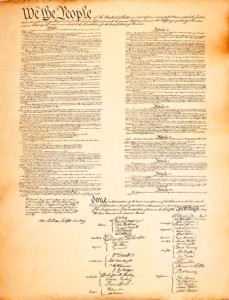Federalism and the future of constitutional government

By John Hendrickson
The late historian and intellectual Stephen J. Tonsor wrote that in America “the Founding is determinative, and the Constitution stands at the very center of American political conservatism.”
Conservatives understand that the American Founding is based upon the principle of liberty and limited government. In framing the Constitution, the Founding Fathers believed that government should be limited, and they achieved this through specific structures and principles contained within the Constitution.
These structures and principles consisted of the rule of law, limited government, separation of powers, checks and balances, and federalism. Russell Kirk, the intellectual father of the post-World War II conservative movement, wrote that the “American political system, first of all, is a system of limited, delegated powers, entrusted to political officers and representatives and leaders for certain well-defined public purposes.”
The Constitution is a written document that limits the powers of the federal government. Article I, Section 8, lists the enumerated powers of Congress, and these are the only specific powers that Congress can exercise. During the ratification debates over the Constitution, Virginian firebrand patriot Patrick Henry and others feared the Constitution actually granted too much power to our federal government. That power would not only endanger the liberty of the people, but also the rights of states.
TIMELESS: The Founding Fathers believed government should be limited and articulated this in the principals contained in the Constitution.
It is important to keep in mind that under the Constitution the people are sovereign. “The people delegate to government only so much power as they think it prudent for government to exercise; they reserve to themselves all the powers and rights that are not expressly granted to the federal or state or local governments,” wrote Kirk.
In reassuring that the true intent of the Constitution was to limit power, James Madison, the principle architect of the Constitution, wrote in Federalist Paper 45: “The powers delegated by the proposed constitution to the federal government are few and defined. Those which remain in the state governments, are numerous and indefinite.”
Madison’s argument in Federalist 45 was further illustrated when the Constitution was amended by the 10th Amendment to the Constitution, which explicitly states: “The powers not delegated to the United States by the Constitution, nor prohibited by it to the States, are reserved to the States respectively, or to the people.”
With enumerated powers and the 10th Amendment the powers of the federal government would be limited and the states would be protected. Debates over governmental powers and federalism are some of the main political and constitutional debates that still occur today, as they have throughout our history.
The size and scope of the federal government has risen gradually during our history, but a fundamental change occurred during the 20th century. The Progressive Movement started to argue that the Constitution was out of date and the federal government needed more power to govern a modern, urban, and industrial nation. The result was the administrative and welfare states, which emerged under President Franklin D. Roosevelt’s New Deal and President Lyndon B. Johnson’s Great Society.
To restore traditional federalism, states as well as the people will have to repent of progressivism and return to the principles of the Constitution. Only when people rediscover the principles of the American founding will federalism be restored.
The views expressed in this column are those of the author and not necessarily those of the Public Interest Institute. They are brought to you in the interest of a better informed citizenry.
John Hendrickson, Research Analyst, Public Interest Institute, 600 North Jackson Street, Mount Pleasant, IA 52641-1328. Ph: 319-385-3462, Web site:www.LimitedGovernment.org. Contact him at Public.Interest.Institute@LimitedGovernment.org.







